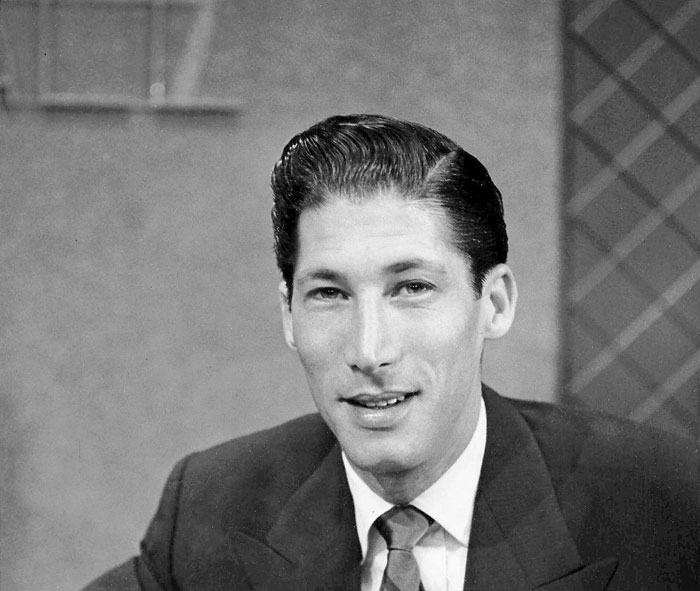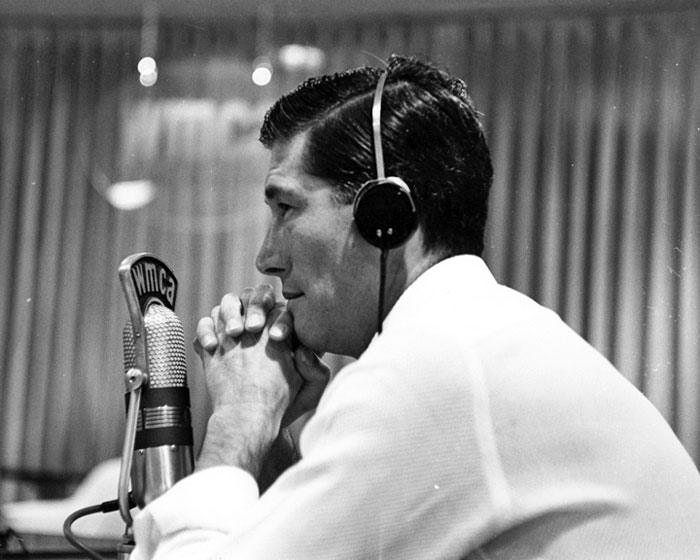OLD TIME RADIO - 7 mp3 - Total Playtime: 4:31:08

Barry Gray (born Bernard Yaroslaw; July 2, 1916; Red Lion, New Jersey – December 21, 1996) was an influential American radio personality, often labeled as "The father of Talk Radio".
Initially a disc jockey, Gray was working for New York's WMCA radio station in 1945 when he, bored one evening with simply spinning music, decided to put the telephone receiver up to his microphone and share his conversation with the listening audience. The caller that evening just happened to be bandleader Woody Herman, one of the most popular celebrities of the day. This spontaneous live interview was such a hit with both his listeners as well as station bosses, that the talk radio format resulted. Gray subsequently began doing listener call-ins as well.
However, the technical aspects of early Cold War broadcasting were challenged by the live call-in, over-the air format. U.S. government restrictions and problematic consequences could not stop Gray's talk show success in putting listeners on the air ... with or without WMCA and the government's permission. His audience loved it, and grew exponentially.
Rival station WOR also saw the attraction of the talk format, and Gray worked an overnight shift there from 1945 to 1948 or 1949, interviewing everyone from Al Jolson to Adam Clayton Powell, Jr. He also broadcast for WMGM from the Copacabana night club in the late 1940s.
Gray broadcast on WMIE AM radio from three Miami Beach nightclubs, the Copa Lounge, Danny and Doc's Jewel Box and the Martha Ray Club nightly in the fall of 1948 and into 1949 before he left the Miami area under some pressure. Gray bopped someone from his audience with his microphone, and this happened on the air. The impact was audible and the impact had been preceded by hot words of anger. This report of recollection fifty-eight years later comes from Ernest W. Bennett of Miami, Florida, who listened to Gray's broadcast every weeknight, beginning in Bennett's sophomore year at the University of Miami in the fall of 1948. Carl Warner, a retired newspaper publisher living in Clinton, Tennessee, was then the remote engineer for the Barry Gray Miami Beach broadcasts. He also recalls the bopping-mike incident. He remembers hearing a loud bang in his headphones and looking up to the Copa Lounge stage seeing the podium turned over and Barry signaling him to cut the mikes. After about 30 seconds of dead air, he asked for his mike to be turned on.
Bennett recalls that period, and recalls from memory other reports of Gray's other pugnacious altercations, the final one, the audible one, was what apparently impelled Gray's departure. Gray said himself as Bennett recalls the exciting live-broadcast event, "I just hit the guy over the head with my microphone, folks." In this case the victim had been the aggressor toward Gray.
The so-called victim was Reubin Clein, publisher of Miami Life. Reubin Clein was considered an agitator and generally an aggressive character. He was a former boxer; there were many in Miami who felt Clein should have been put in his place, but no one would ever mess with him because he was one of toughest people you would ever meet. Clein was always into Wild West characters and would often wear a cowboy hat, boots and would have a big wooly beard. A generally gentle person would not take crap from anyone and actually broke the mayor's nose at a political rally.
According to Bennett, Gray was popular on Miami radio: "He was very big here; number one, like Larry King is known today. Indeed, Larry King began his broadcasting career from a houseboat anchored in front of the Miami Beach Fountainbleau Hotel in 1957."
Barry Gray returned to WMCA in 1950, and stayed there for 39 years, refining the talk show format still utilized today. During the 1960s, he was in the odd position of having an 11 p.m.-1 a.m. late night talk show on a station otherwise dominated by Top 40 music and the youth-targeted "Good Guys" disc jockey campaign. But for teenagers who kept their radios on into the night, Gray's show was a window into the high-brow New York culture of the 1940s and 1950s. Gray would often have authors on, and he made a point of saying he had actually read their books, something not all talk show hosts did. Gray also had a tendency towards risqué (for the time) topics, such as the novel nudity found in European films playing in art houses, or characteristics of the prostitution scene in Manhattan.
He was also known as a fierce critic of bigotry and survived the ugliness of McCarthyism and the Red Scare. A constant target of the blacklisting right-wing columnist Walter Winchell, who called him "Borey Pink" and "a disk jerk" in the 1950s, Barry was fearless in calling out those he found mired in hypocrisy and abusive in power. The Winchell feud seemed to haunt him, however; years after Winchell had lost influence and become a recluse, Gray would still talk darkly on air about plots and physical attacks Winchell had orchestrated against him. Indeed, a 1995 biography of Winchell would report that he kept a photograph of a bloodied Gray on his walls.
After WMCA changed to an all-talk format in 1970, Gray was again fully in his element. He never backed away from discussing hot topics in politics, especially those that affected New Yorkers. A 1973 profile described him as "brash, abrasive [and] opinionated. [He] was the talk-show titan listeners love to hate, [and] is still going after more than a quarter of a century at the mike." By the 1980s he had shifted from a late-night to a mid-day slot at the station.
Gray left WMCA in 1989 when it dropped its talk format, and went to work slightly up the dial for a return to WOR where he enjoyed national syndication. By the time of his passing, his show was considered to be politically conservative.
Gray appeared as his disc jockey self in the 1949 short subject Spin That Splatter. Gray also pioneered in early television, first as the host of The Barry Gray Show on New York WOR-TV when Channel 9 went on the air in 1949, then more visibly as host of the very first Goodson and Todman game show Winner Take All, replacing Bud Collyer in 1951. The Game Show Network airs these very rare episodes every now and then, and they are informative: Gray's hosting style has more in common with today's David Letterman and Conan O'Brien than the classic television game show hosts of yesteryear.
In 2002, industry publication Talkers magazine selected Barry Gray as the 8th greatest radio talk show host of all time.

SHOWS LIST
Barry Gray Show 40-xx-xx - Al Jolson, Henny Youngman, Joey Adams
Barry Gray Show 46-10-27 Guest - Al Jolson
Barry Gray Show 47-06-14 Guest - Victor Moore
Barry Gray Show 49-09-23 Guest - Canada Lee & Mac Clark
Barry Gray Show 49-09-30 Guest - Adam Clayton Powell
Barry Gray Show 49-10-07 Barry Went To See 'Death Of A Salesman'
Barry Gray Show 49-10-14 Guest - Milton Berle
THESE ARE MP3 RECORDINGS
THEY WILL NOT PLAY IN REGULAR CD PLAYERS
CLICK HERE TO KNOW MORE ABOUT mp3
CLICK HERE TO LEARN MORE ABOUT OUR PRODUCTS
We guarantee delivery of your item. If your item doesn't get there or is damaged, please notify us and we'll reship for you.
FULL REFUND IF NOT SATISFIED
This product was added to our catalog on Sunday 12 January, 2014.
